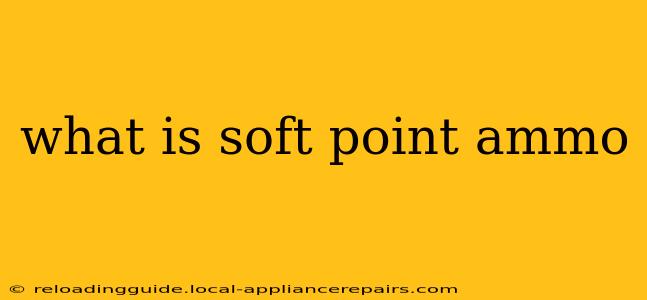Soft point ammo, also known as soft nose ammo, represents a specific type of bullet design primarily used for hunting and target shooting. Understanding its characteristics is crucial for anyone involved in these activities. This comprehensive guide will explore the intricacies of soft point ammo, its advantages, disadvantages, and appropriate applications.
Understanding the Soft Point Bullet Construction
The defining feature of soft point ammunition is its partially exposed lead core at the tip of the bullet. Unlike full metal jacket (FMJ) rounds, which have a completely encased lead core, soft point bullets have a softer, exposed lead core at the bullet's nose. This exposed lead is often covered by a thin jacket of gilding metal (usually copper-plated), which helps with stability and feeding in semi-automatic firearms. This design influences how the bullet behaves upon impact.
How the Soft Point Design Works
The exposed lead core contributes to the bullet's expansion upon impact. When the bullet strikes its target, the softer lead core deforms more readily than a fully jacketed bullet, leading to increased diameter and energy transfer. This expansion results in a larger wound cavity, increasing stopping power and lethality in hunting situations. The remaining jacket material helps maintain bullet stability during flight.
Advantages of Soft Point Ammo
Soft point ammunition offers several compelling advantages, making it a popular choice among hunters and target shooters:
- Increased Expansion: The partially exposed lead core ensures reliable expansion upon impact, maximizing energy transfer to the target. This is vital for humane hunting practices and effective game harvesting.
- Improved Stopping Power: The greater expansion and energy transfer contribute to superior stopping power compared to FMJ ammunition.
- Accuracy: While not as accurate as some other bullet types in extreme long-range shooting, soft point ammo provides sufficient accuracy for hunting and most target shooting needs.
- Controlled Expansion: The design promotes controlled expansion, preventing excessive fragmentation that could reduce penetration depth. The balance between expansion and penetration is crucial for effective hunting.
Disadvantages of Soft Point Ammo
Despite its benefits, soft point ammo does possess some limitations:
- Less Penetration: Compared to FMJ or hard-cast bullets, soft point rounds generally offer less penetration due to their tendency to expand rapidly upon impact. This can be a disadvantage when hunting larger or tougher game.
- Sensitivity to Barrel Rifling: The softer lead core can be more susceptible to damage from aggressive barrel rifling, potentially impacting accuracy and leading to inconsistent expansion.
- Potential for Fouling: Some shooters report increased fouling in their firearms when using soft point ammunition, though this is generally dependent on the specific firearm and ammunition.
Choosing the Right Soft Point Ammo
Selecting the appropriate soft point ammunition depends on several factors:
- Caliber: Choosing the correct caliber is paramount and determined by the intended game and hunting regulations.
- Game Type: The size and type of game dictate the bullet weight, velocity, and expansion characteristics needed for a clean and ethical kill.
- Rifle and Barrel Characteristics: The firearm's rifling and barrel length can affect bullet performance. Some rifles benefit more from certain soft point designs than others.
Soft Point Ammo vs. Other Bullet Types
It's essential to compare soft point ammo to other bullet types to fully appreciate its strengths and weaknesses. The key differences lie in bullet construction and resulting performance characteristics. For example, hollow point ammunition offers even greater expansion but can be more prone to fragmentation. FMJ rounds prioritize penetration over expansion, making them suitable for target practice but less effective for hunting.
Conclusion: A Versatile Hunting and Target Shooting Choice
Soft point ammo represents a balanced compromise between expansion and penetration, offering a versatile solution for hunters and target shooters. Understanding its unique characteristics and choosing the appropriate cartridge for your specific needs is key to maximizing its effectiveness and ensuring safe and ethical practices. Always consult relevant hunting regulations and guidelines before selecting and using ammunition.

